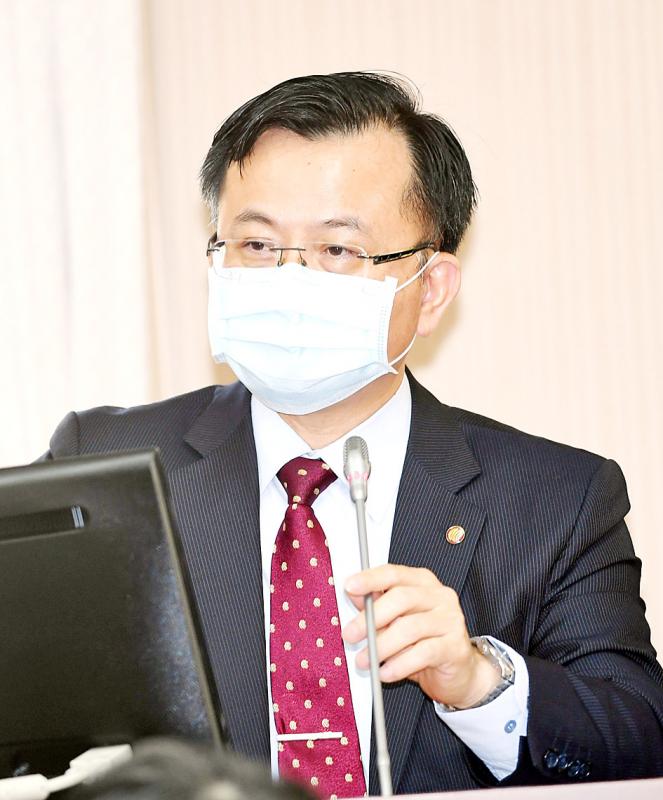A draft digital communications act is to be submitted to the Executive Yuan after division of labor between the National Communications Commission (NCC) and a yet-to-be-established ministry of digital development is ascertained, NCC Chairman Chen Yaw-shyang (陳耀祥) said yesterday.
Chen made the remarks at a meeting of the legislature’s Transportation Committee, at which lawmakers discussed unfreezing part of the commission’s budget.
However, most of the focus was on the commission’s progress in drafting the digital communications bill, which critics say would be how the commission would censor online content.

Photo: CNA
Lawmakers asked how the commission’s activities would change once the new ministry is established, as it would be in charge of developing the telecommunications industry.
“The new ministry is to focus on the development of the nation’s digital industry and is to stipulate an act to facilitate the industry’s growth,” Chen said.
“The NCC is to enforce the digital communications act, which would authorize the commission to oversee online platform operators, which are to be held accountable for the content shown on their platforms,” he said.
The draft law is not designed to censor online content, Chen said, adding that it is impossible to regulate all Internet content.
“The laws that are enforced in the physical world remain effective in the virtual world,” he said. “If the content is about an epidemic, for example, the Ministry of Health and Welfare would review it based on the Communicable Disease Control Act [傳染病防治法].”
The digital communications act, once promulgated, would allow the commission to establish a one-stop service for people to file complaints over online content, he said.
Each case would be relayed to the administrative agency in charge, he said.
“If the complaints were over potentially criminal activity, they would be handled through interdepartmental coordination,” he said.
“If the problematic content originated overseas, the law would authorize the commission and other government agencies to work with overseas partners to address them,” he said.
Large international platforms such as Facebook, Google and YouTube would be asked to participate in a self-regulatory mechanism in Taiwan to address international issues, such as Internet violence and fraud, Chen said.
Lawmakers asked about the commission’s progress in drafting an act governing the management of Internet audiovisual services, which would regulate Netflix, Line TV and other over-the-top (OTT) streaming services.
The commission on May 24 is to hold an interdepartmental meeting to discuss details in the draft OTT act, Chen said, adding that it would hold a public hearing next month.
“We are hoping that we can submit the digital communications and the OTT acts to the Executive Yuan for review during the next legislative session, which begins in September,” he said.

Taiwan is stepping up plans to create self-sufficient supply chains for combat drones and increase foreign orders from the US to counter China’s numerical superiority, a defense official said on Saturday. Commenting on condition of anonymity, the official said the nation’s armed forces are in agreement with US Admiral Samuel Paparo’s assessment that Taiwan’s military must be prepared to turn the nation’s waters into a “hellscape” for the Chinese People’s Liberation Army (PLA). Paparo, the commander of the US Indo-Pacific Command, reiterated the concept during a Congressional hearing in Washington on Wednesday. He first coined the term in a security conference last

Prosecutors today declined to say who was questioned regarding alleged forgery on petitions to recall Democratic Progressive Party (DPP) legislators, after Chinese-language media earlier reported that members of the Chinese Nationalist Party (KMT) Youth League were brought in for questioning. The Ministry of Justice Investigation Bureau confirmed that two people had been questioned, but did not disclose any further information about the ongoing investigation. KMT Youth League members Lee Hsiao-liang (李孝亮) and Liu Szu-yin (劉思吟) — who are leading the effort to recall DPP caucus chief executive Rosalia Wu (吳思瑤) and Legislator Wu Pei-yi (吳沛憶) — both posted on Facebook saying: “I

The Ministry of Economic Affairs has fined Taobao NT$1.2 million (US$36,912) for advertisements that exceed its approved business scope, requiring the Chinese e-commerce platform to make corrections in the first half of this year or its license may be revoked. Lawmakers have called for stricter enforcement of Chinese e-commerce platforms and measures to prevent China from laundering its goods through Taiwan in response to US President Donald Trump’s heavy tariffs on China. The Legislative Yuan’s Finance Committee met today to discuss policies to prevent China from dumping goods in Taiwan, inviting government agencies to report. Democratic Progressive Party Legislator Kuo Kuo-wen (郭國文) said

The Ministry of Economic Affairs has fined Taobao NT$1.2 million (US$36,900) for advertisements that exceeded its approved business scope and ordered the Chinese e-commerce platform to make corrections in the first half of this year or its license would be revoked. Lawmakers have called for stricter supervision of Chinese e-commerce platforms and more stringent measures to prevent China from laundering its goods through Taiwan as US President Donald Trump’s administration cracks down on origin laundering. The legislature’s Finance Committee yesterday met to discuss policies to prevent China from dumping goods in Taiwan, inviting government agencies to report on the matter. Democratic Progressive Party